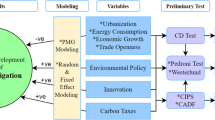Abstract
Eco-taxation is the preferred market based tool for achieving mitigation of CO2 emissions and fostering sustainability. It works through tax-induced changes in the price of polluting activities while ideally transferring the environmental cost to emitters and users. The initial eco-tax signaling is transmitted and further amplified to the rest of the economy through the structure of cost interactions. In particular, real-world economies work under wage adjustment rules that reflect downward rigidity in labor costs when facing rising prices. These common rules may affect the mitigation capacity of the eco-tax policies. We study this issue using an inter-industry model in which we overcome the classical dichotomy between prices and quantities thanks to the novelty of connecting consumption demand with the changes in private income levels that would follow from the enacted eco-tax. We isolate income effects by keeping the given productive structure of the economy as unaltered as possible. In this sense, the proposed model has a bit of a neo-ricardian flavor. We implement the model and check the mitigation effectiveness of two different eco-tax policies using recent tabular data for the Spanish economy in 2015. The main conclusion is that we would not observe double benefits, even when all eco-tax collections are recycled back into the economy.

Similar content being viewed by others
Notes
We use CONOPT as the default solver and the algorithm DNLP available within CONOPT.
References
André FJ, Cardenete MA, Velazquez E (2005) Performing an environmental tax reform in a regional economy. A computable general equilibrium approach. Ann Reg Sci 39:375–392
Bardazzi R (1996) Reduction in Social Security contributions: which alternatives for financing coverage? Econ Syst Res 8(3):247–270
Bosquet B (2000) Environmental tax reform: does it work? A survey of the empirical evidence. Ecol Econ 34:19–32
Cardenete MA, Guerra AI, Sancho F (2016) Applied general equilibrium: an introduction, 2nd edn. Springer, New York
De Souza KB, de Santana LC, Perobelli FS (2016) Reducing Brazilian greenhouse emissions: scenario simulations of targets and policies. Econ Syst Res 28(4):482–496
Freire J, Ho MS (2019) Carbon taxes and the double dividend hypothesis in a recursive-dynamic CGE model for Spain. Econ Syst Res 31(2):267–284
Fullerton D, Muehlegger E (2019) Who bears the economic burden of environmental regulations? Rev Environ Econ Policy 13(1):62–82
Gemechu ED, Butnar I, Llop M, Castells F (2014) Economic and environmental effects of CO2 taxation: an input-output analysis for Spain. J Environ Plan Manag 57(5):751–768
Guerra AI, Sancho F (2018) On the need to compensate the compensating variation in CGE modeling. Econ Syst Res 30(3):313–322
Guerra AI, Manresa A, Sancho F (2018) The true index of cost of living under general equilibrium: the numéraire matters. Econ Lett 173:69–72
INE (2014) Boletín Informativo del Instituto Nacional de Estadística, n.8. Madrid, Spain
Kiuila O, Matkandya A, Scasny M (2019) Taxing air pollutants and carbon individually or jointly: results from a CGE model enriched by an emission abatement. Econc Syst Res 31(1):21–43
Llop M, Pié L (2008) Input–output analysis of alternative policies implemented on the energy activities. Energy Policy 36:1642–1648
Maxim MR, Zander K (2019) Can a green tax reform entail employment double dividend in European and non-European countries? A survey of the empirical evidence. Int J Energy Econ Policy 9(3):218–228
Maxim MR (2020) Environmental fiscal reform and the possibility of triple dividend in European and non-European countries: evidence from a meta-regression analysis. Environ Econ Policy Stud. https://doi.org/10.1007/s10018-020-00273-8
Miller RE, Blair PD (2009) Input–output analysis: foundations and extensions, 2nd edn. Cambridge University Press, New York
OECD (2019) Taxing energy use 2019: using taxes for climate action. OECD Publishing, Paris. https://doi.org/10.1787/058ca239-en
Padilla E, Duro JA (2013) Explanatory factors of CO2 per capita emission inequality in the European Union. Energy Policy 62:1320–1328
Roland-Holst D, Sancho F (1995) Modeling prices in a SAM structure. Rev Econ Stat 77(2):361–371
Rose A (1983) Technological change and input–output analysis: an appraisal. Socio Econ Plan Sci 18(5):305–318
Shoven JB, Whalley J (1984) Applied general equilibrium models of taxation and international trade: an introduction and survey. J Econ Lit 22:1007–1051
Sraffa P (1960) Production of commodities by means of commodities. Cambridge University Press, Cambridge
Acknowledgements
I would like to acknowledge support from research project MICINN-ECO2017-85534P. I am also grateful to two referees for their excellent points and suggestions for improvement. Needless to say, any remaining errors are solely my own.
Author information
Authors and Affiliations
Corresponding author
Additional information
Publisher's Note
Springer Nature remains neutral with regard to jurisdictional claims in published maps and institutional affiliations.
About this article
Cite this article
Sancho, F. The mitigation potential of eco-taxation on carbon emissions: income effects under downward rigid wages. Environ Econ Policy Stud 23, 93–107 (2021). https://doi.org/10.1007/s10018-020-00280-9
Received:
Accepted:
Published:
Issue Date:
DOI: https://doi.org/10.1007/s10018-020-00280-9




